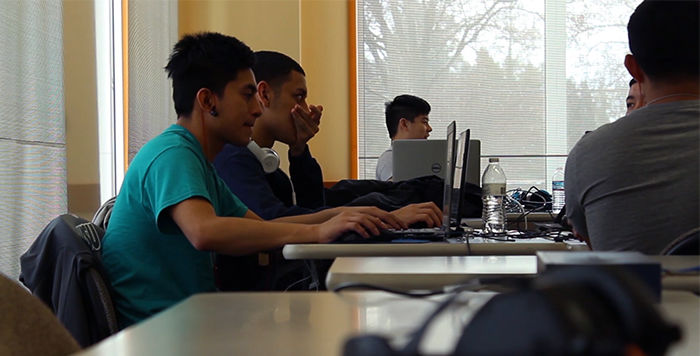Hackathon helps computer science students’ futures
The Association for Computing Machinery Crimson Code Hackathon gives the top two competing teams prizes and internship recognition.
February 6, 2017
Computer science students spent two straight days scattered throughout the CUE building for the Association for Computing Machinery’s annual Crimson Code Hackathon on Saturday and Sunday.
Hundreds of students took part in 36 hours of developing codes, apps and games in teams of up to four or individually.
This event allowed computer science students to receive proper help from professionals in the field.
“Engineers from all over the state are invited to help the students out throughout the development process,” Sponsorship Coordinator Cammi Smith said.
Several of the participants receive offers for internships and jobs, Smith said.
“Our main job as a club is to make sure these students get good internships and jobs,” Smith said.
The coding these students develop is solely based on their creativity. Students are given free range to create whatever they want, she said.
When the coding is finished, some students who don’t win may still walk away with a blueprint for something they could develop in the future, Smith said.
“60 percent or more participants are freshmen and sophomores,” she said.
Smith said she is here for the WSU students just starting their careers, helping guide them with events like the hackathon to instill confidence and experience.
“I need to get some sleep,” she said at the end of the 48-hour event.
The hackathon was free for participants with pizza provided.
“This event gives the students more opportunities to have a brighter future,” Smith said.
The winners of the event were announced on Sunday. First place was the team “Byte Me,” made up of Matthew Merrick and Jackson Peven, who spent their 48 hours developing a network multiplexer/load balancer for Docker engine.
The team won a prize donated by the sponsors of the event: Alaska Airlines, Schweitzer Engineering Laboratories, Concur, Chief Architect and Dell EMC. Their prize choices were Bose speakers/headphones, Amazon Echo’s Alexa or Go Pro cameras.
The other two top competing teams also won prizes and internship recognition. The second-place team was called “Star Hopper” and developed an iPhone app that utilizes gyroscopic input for astronomical research.
The third-place team, “Manny bites dog,” developed a text adventure app game for the iPhone.
Editor’s note: This article has been revised to reflect that the Hackathon lasted 36 hours, not 48.





















